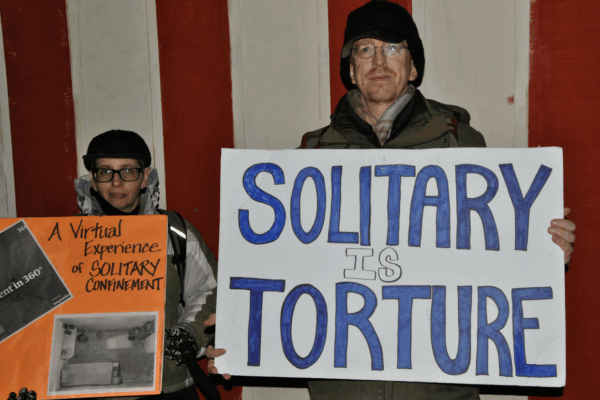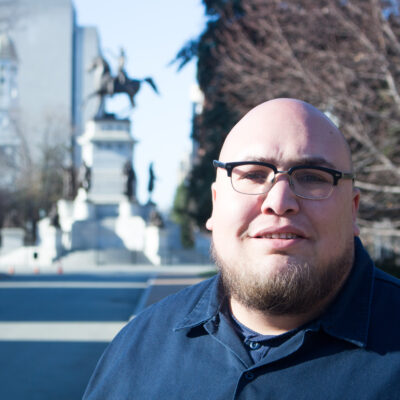The ACLU of Virginia this week released its report, Silent Injustice: Solitary Confinement in Virginia, after years of hard work, research and conversations with inmates in solitary confinement.
Its findings – that the practice of solitary in Virginia prisons is widespread, arbitrarily punitive, and must be severely restricted – are at once startling and cursory to the real inhumanities people in solitary face.
There is no dearth of material on the statistics regarding this population or the horrific conditions they live in, and it is our hope that this paper will add to the library of work on the unsustainable and inhumane practice of solitary confinement in a way that helps spur action.
I have had the opportunity to be a part of these conversations along with some of our partner firms. We’ve spoken with inmates who came from wildly disparate backgrounds but clearly had two things in common: difficult pasts and irrevocable mistakes.
Our office regularly receives letters from inmates housed in facilities all over Virginia. As difficult as it is to admit, handwritten letters with descriptions of abuse and court records listing grievous offenses can become theoretical over time. Being able to look inmates in the eye and connect with their circumstances bridges the gap that keeps their histories academic.
Nearly all the men we spoke to came from isolated, arduous upbringings in which they struggled for identity and purpose, some even for the basic rudiments of life. Regardless of their past, however, the nature of their offenses and their culpability is a matter that has been decided by a court. What hasn’t been is whether these men, many already dealing with trauma, should be subjected to prolonged isolation and denial of human contact, natural light and basic human dignities, and left alone, often for 22-24 hours a day, with their own sometimes overwhelmingly toxic thoughts.
There was a pervasive sense of hopelessness in our conversations. The assignment to Security Level S - for segregation, the whitewashed term the state Department of Corrections uses instead of the accurate phrase “solitary confinement” - for most of the inmates we spoke to, was a punitive one.
With no clear path out of solitary confinement, they only have a seemingly unending term of confinement to an 80 square-foot cement room with no agency over their conditions. They have no control over when the lights go off, when they eat or drink, or when they can bathe. Communication is limited, through the air vent, to other men they don’t know who often are suffering from similar, often severe, mental health issues.
Cutting themselves or inciting the guards can often feel like the only control they can grasp or means of communicating their issues. Help is rarely forthcoming, as qualified mental health practitioners are in short supply. Almost all of them hold their cells in a state of cognitive dissonance where it is simultaneously a place of relative safety and persistent torment. The incessant tedium is more often than not broken by a correctional officer with whom interactions can be unpredictable and potentially volatile for both parties. When issues arise, a new set of frustrations often replaces boredom as the struggle for grievance forms and other administrative supports begins again.
As Red Onion State Prison is located in a far corner of the state, it becomes readily apparent that these men are sent here to be forgotten. Both prisons are in Wise County, population 40,000, in a part of Appalachia colloquially known as the “Mountain Empire.”
The county is 93 percent white, geographically isolated, and culturally insular. Race and class have a complex history in the region, which settled into a racial homogeny after mixed mining camps closed. Even after the interstate connected the region at large with the rest of the country, Wise remained an hour off I-81.
The isolation has created a hard-working community with limited exposure to people of color -groups who are sometimes first introduced to the citizens of Wise at Red Onion and Wallens Ridge. With the inmate populations being 70 percent non-white, the collision of cultures within the constraints of the inmate-guard relationship make relationships perilous; at times, culminating in racially motivated conflicts.
Beyond the prison walls, there is no lack of support from the community at large. WMMT 88.7 FM in Whitesburg, Ky., airs a show on Monday nights, called “Calls from Home,” formerly “Holler to the Hood,” during which inmates at Red Onion, Wallens Ridge, and U.S. Penitentiary, Lee, can hear shout outs, messages, and love from family members at home.
Walking into Red Onion, the silver maze of chain link and razor wire clashes with the landscape. For anyone familiar with correctional facilities, the common monochromatic sterility of painted cinderblock and the din of yelling men is nothing new. The difference here comes the moment the correctional officer unshackles the inmate you’re speaking to and you begin your interview.
In a broad sense, the general complaints are ones the ACLU of Virginia hears most often - administrative issues, food quality, access to privileges and programs, issues with correctional officers. The universal frustration shared by all inmates is differentiated here by voices struggling desperately against degradation. Prison by its nature is corrosive, but there is an element of broken tenacity in some inmates and resigned despair in others. Common to all the men we spoke with is the overwhelming desire to find a way to never be trapped behind that steel door again.
And that, as will become evident from reading Silent Injustice, is a goal that, absent real and lasting changes within the department of corrections, most of the men languishing at Red Onion and Wallen’s Ridge may never attain


